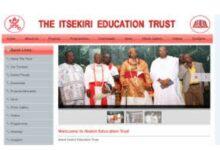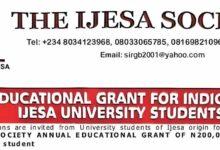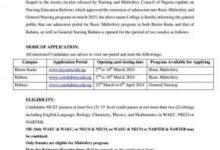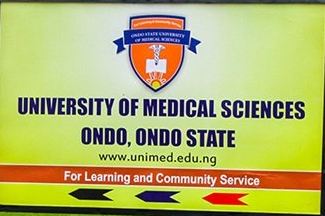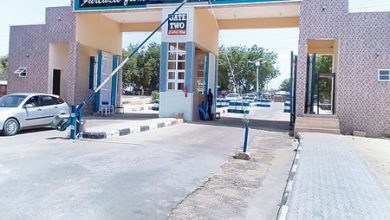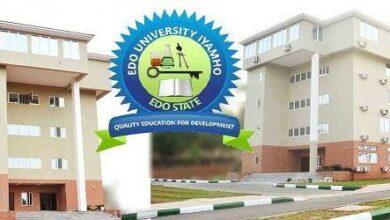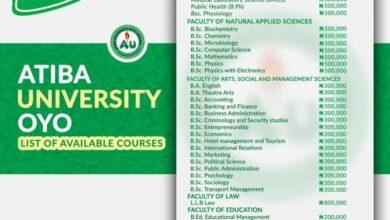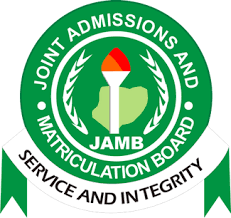
JAMB Economics Syllabus 2023 and Recommended Texts for UTME
Are you preparing to take the JAMB Economics examination? If yes, then you need the recommended texts for UTME which is contained in the JAMB syllabus for economics.Information Guide Nigeria
The JAMB 2023 Economics syllabus is a document that contains the recommended topics and texts to study for the upcoming JAMB UTME Examination. So if you’re preparing to take the economics exam, then the best study material would be the syllabus.
👉 Relocate to Canada Today!
Live, Study and Work in Canada. No Payment is Required! Hurry Now click here to Apply >> Immigrate to CanadaIn today’s post, I will be showing you the complete topics and recommended tests in the JAMB 2023 Economics syllabus. So carefully read through this post.JAMB Economics Syllabus 2023 and Recommended Texts for UTME
Read Also: WAEC Syllabus for Chemistry
JAMB Syllabus for Economics 2023
In the JAMB 2023 Economics Syllabus, its course objectives are as follows:
- Demonstrate sufficient knowledge and understanding of the basic concepts, tools and their general applications to economic analysis;
- Identify and explain the basic structures, operations and roles of the various economic units and institutions (national and international);
- Describe major economic activities – production, distribution and consumption;
- Identify and appraise the basic and current economic problems of society;
- Develop the competence to proffer solutions to economic problems identified.
Complete JAMB Syllabus for Economics 2023
Below is the JAMB syllabus for Economics 2023:
1. Economics as a Science
Topics:
Basic Concepts: Wants, Scarcity, choice, scale of preference, opportunity cost, Rationality, production, distribution, consumption.
Economic problems of What, how and for whom to produce and efficiency of resource use.
Application of PPF to solution of economic problems.
👉 Relocate to Canada Today!
Live, Study and Work in Canada. No Payment is Required! Hurry Now click here to Apply >> Immigrate to CanadaObjectives:
- Compare and contrast various economic concepts and their applications.
- Interpret graphs/schedules in relation to the concepts;
- Identify various economic issues;
- Proffer solutions to economic issues.20 Best Neutrogena Skin Care in Nigeria an their Prices
Read Also: WAEC Syllabus for Financial Accounting
2. Economic Systems
Topics:
Types and characteristics of free enterprise, centrally planned and mixed economies.
Solutions to economic problems under different systems.20 Best Toy Games and their Prices in Nigeria
Contemporary issues in economic systems (economic reforms e.g deregulation, banking sector consolidation, cash policy reform).
Objectives:
- Candidates should be able to;
- Compare various economic systems around the world.
- Apply the knowledge of these economic systems to contemporary issues in Nigeria
- Proffer solutions to economic problems in different economic systems.
3. Methods and Tools of Economic Analysis
Topics:
Scientific Approach:NYSC Portal
- Inductive and deductive methods
- Positive and normative reasoning
Basic Tools
- Tables, charts and graphs
- Measures of central tendency: mean, median and mode, and their applications.
- Measures of dispersion; variance, standard deviation, range and their applications;
- Merits and demerits of the tools.
Objectives:
Candidates should be able to;
- Differentiate between the various types of reasoning;
- Apply these types of reasoning to real-world scenarios;
- Interpret economic data using the tools;105 Good Morning My Love Messages
- Using the tools, analyze economic data;
- Examine the tools’ advantages and disadvantages.
4. The Theory of Demand
Topics:
Meaning and determinants of demand
- Demand schedules and curves
- The distinction between change in quantity demanded and change in demand.
Types of demand: Composite, derived, competitive and joint demand:
Types, nature and determinants of elasticity and their measurement – price, income and cross elasticity of demand:
Importance of elasticity of demand to consumers, producers and government.
Objectives:
Candidates should be able to;
- Determine the factors that influence demand;200 Romantic Love Messages for her
- Demand curves should be interpreted based on demand schedules.
- Distinguish between a change in demand and a change in quantity demanded.
- Examine the various types of demand and their interdependence;
- Connect the determinants to the properties of elasticity.
- Calculate elasticities;
- Interpret elasticity coefficients in terms of real-world situations.
5. The Theory of Consumer Behaviour
Topics:
Basic Concepts:
- Utility (cardinal, ordinal, total average and marginal utilities)
- Indifference curve and budget line.
- Diminishing marginal utility and the law of demand.
- Consumer equilibrium using the indifference curve and marginal analyses.
- Effects of shift in the budget line and the indifference curve.
- Consumer surplus and its applications.
Objectives:
Candidates should be able to;
- Describe the various utility concepts.
- Using the marginal utility analysis, apply the law of demand;
- To determine consumer equilibrium, use indifference curves and marginal analyses.
- Determine the relationship between the income and substitution effects.
- Apply consumer surplus to real-world scenarios.
6. The Theory of Supply
Topics:
- Meaning and determinants of supply
- Supply schedules and supply curves
- The distinction between change in quantity supplied and change in supply
- Types of Supply: Joint/complementary, competitive and composite
- Elasticity of Supply: determinants, measurements, nature and applications
Objectives:
Candidates should be able to;
- Determine the factors that influence supply;
- Supply curves should be interpreted based on supply schedules.
- Distinguish between a change in quantity supplied and a change in supply.
- Compare the different types of supply and their interdependence;
- Connect the determinants to the properties of elasticity.
- Calculate the elasticity coefficients;
- Interpret the coefficients in terms of real-world situations.
Read Also: JAMB Government Syllabus 2023 and Recommended Texts for UTME
7. The Theory of Price Determination
Topics:
- The concepts of market and price
- Functions of the price system
- Equilibrium price and quantity in product and factor markets
- Price legislation and its effects
- The effects of changes in supply and demand on equilibrium price and quantity.
Objectives:
Candidates should be able to;
- Explain the terms market and price.
- Examine the price system’s functions.
- Examine the effects of government intervention in the price system.
- Distinguish between minimum and maximum price legislation;
- Interpret the effects of supply and demand changes on equilibrium price and quantity.
8. The Theory of Production
Topics:
- Meaning and types of production
- Concepts of production and their interrelationships (TP, AP, MP and the law of variable proportion).
- Division of labour and specialization
- Scale of Production:
- Internal and external economies of scale and their implications.
- Production functions and returns to scale
- Producers’ equilibrium isoquant-isocost and marginal analyses.
- Factors affecting productivity.
Objectives:
Candidates should be able to;
- Relate TP, AP and MP with the law of variable proportion;
- Compare internal and external economies of scale in production and their effects;
- Identify the types of production functions
- Compare the different types of returns to the scale and their implications;
- Determine the firm’s equilibrium position using the isoquant-isocost and marginal analyses.
- Identify the factors affecting productivity.
9. Theory of Costs and Revenue
Topics:
- The concepts of cost: Fixed, Variable, Total Average and Marginal
- The concepts of revenue: Total, average and marginal revenue;
- Accountants’ and Economists’ notions of cost
- Short-run and long-run costs
- The marginal cost and the supply curve of the firm.
Objectives:
Candidates should be able to;
- Explain the various cost concepts
- Differentiate between accountants’ and economists’ notions of costs
- Interpret the short-run and long-run costs curves
- Establish the relationship between marginal cost and supply curve.
- Explain the various revenue concepts.
10. Market Structures
Topics:
Perfectly competitive market:
- Assumptions and characteristics;
- Short-run and long-run equilibrium of a perfect competitor;
Imperfect Market:
- Pure monopoly, discriminatory monopoly and monopolistic competition.
- Short-run and long-run equilibrium positions.
Break-even/shut-down analysis in the various markets.
Objectives:
Candidates should be able to;
- Analyse the assumptions and characteristics of a perfectly competitive market;
- Differentiate between short-run and long-run equilibrium of a perfectly competitive firm;
- Analyse the assumptions and characteristics of imperfect markets;
- Differentiate between the short-run and long-run equilibria of imperfectly competitive firms;
- Establish the conditions for the break- even/shut down of firms.
11. National Income
Topics:
- The Concepts of GNP, GDP, NI, NNP
- National Income measurements and their problems
- Uses and limitations of national income estimates
- The circular flow of income (two and three-sector models)
- The concepts of consumption, investment and savings
- The multiplier and its effects
- Elementary theory of income determination and equilibrium national income.
Read Also: WAEC Syllabus for Auto Body Repairs And Spray Painting
Objectives:
Candidates should be able to;
- Identify the major concepts in national income;
- Compare the different ways of measuring national income;
- Examine their problems;
- Assess the uses and limitations of national income estimates;
- Interpret the circular flow of income using the two and three-sector models;
- Calculate the various multipliers;
- Evaluate their effects on equilibrium national income;
- Explain the concepts of consumption, investment and savings.
12. Money and Inflation
Topics:
- Types, characteristics and functions of money
- Demand for money and the supply of money
- Quantity Theory of money (Fisher equation)
- The value of money and the price level
- Inflation: Types, measurements, effects and control
- Deflation: Measurements, effects and control.
Objectives:
Candidates should be able to;
- Explain between the types, characteristics and functions of money;
- Identify the factors affecting the demand for and the supply of money;
- Examine the relationship between the value of money and the price level;
- Identify the components in the quantity theory of money;
- Examine the causes and effects of inflation;
- Calculate the consumer price index;
- Interpret the consumer price index;
- Examine ways of controlling inflation.
- Examine the causes, measurement, effects and control of deflation.
13. Financial Institutions
Topics:
- Types and functions of financial institutions (traditional, central bank, mortgage banks, merchant banks, insurance companies, building societies);
- The role of financial institutions in economic development;
- Money and capital markets
- Financial sector regulations
- Deposit money banks and the creation of money
- Monetary policy and its instruments
- Challenges facing financial institutions in Nigeria.
Objectives:
Candidates should be able to;
- Identify the types and functions of financial institutions;
- Explain the roles of financial institutions in economic development;
- Distinguish between the money and capital markets;
- Identify the various financial sector regulators and their functions;
- Explain the money creation process and its challenges;
- Examine the various monetary policy instruments and their effects;
- Appraise the challenges facing the financial institutions in Nigeria.
14. Public Finance
Topics:
- Meaning and objectives
- Fiscal policy and its instruments
- Sources of government revenue (taxes royalties, rents, grants and aids)
- Principles of taxation
- Tax incidence and its effects
- The effects of public expenditure
- Government budget and public debts
- Revenue allocation and resource control in Nigeria.
Objectives
Candidates should be able to;
- Identify the objectives of public finance;
- Explain fiscal policy and its instruments;
- Compare the various sources of government revenue
- Analyse the principles of taxation;
- Analyse the incidence of taxation and its effects;
- Examine the effects of public expenditure on the economy;
- Examine the types and effects of budgets;
- Highlight the criteria for revenue allocation in Nigeria and their impact.
15. Economic Growth and Development
Topics:
- Meaning and scope
- Indicators of growth and development
- Factors affecting growth and development
- Problems of development in Nigeria
- Development planning in Nigeria.
Objectives:
Candidates should be able to;
- Distinguish between economic growth and development;
- Highlight the indicators of growth and development;
- Identify the factors affecting growth and development;
- Examine the problems of development in Nigeria;
- Examine the role of planning in development;
16. Agriculture in Nigeria
Topics:
- Types and features;
- The role of agriculture in economic development;
- Problems of agriculture;
- Effects of agricultural policies and their effects;
- Instability in agricultural incomes (causes, effects and solutions).
Objectives:
Candidates should be able to;
- Identify the types and features of agriculture;
- Examine the characteristics and problems of agriculture;
- Assess the role of agriculture in economic development;
- Appraise agricultural policies in Nigeria;
- Evaluate the causes and effects of instability in agricultural incomes
17. Industry and Industrialization
Topics:
- Concepts and effects of location and localization of industry in Nigeria;
- Strategies and Industrialization in Nigeria;
- Industrialization and economic development in Nigeria;
- Funding and management of business organization;
- Factors determining the size of firms.
Objectives:
Candidates should be able to;
- Differentiate between location and localization of industry;
- Identify the factors influencing the location and localization of industry;
- Examine the problems of industrialization;
- Appraise some industrialization strategies;
- Examine the role of industry in economic development.
18. Natural Resources and the Nigerian Economy
Topics:
- Development of major natural resources (petroleum, gold, diamond, timber etc);
- Contributions of the oil and the non-oil sectors to the Nigerian economy;
- Linkage effects;
- Upstream/downstream of the oil sector;
- The role of NNPC and OPEC in the oil sector;
- Challenges facing natural resources exploitation.
Read Also: JAMB Literature in English Syllabus 2023 and Recommended Texts for UTME
Objectives:
Candidates should be able to;
- Trace the development of the major natural resources in Nigeria;
- Assess the contribution of the oil and the non-oil sectors to the Nigerian economy;
- Establish the linkages between the natural resources and other sectors;
- Analyse the environmental effects of exploitation activities in Nigeria;
- Distinguish between the upstream and downstream activities in the oil sector ;
- Examine the roles of NNPC and OPEC in the oil sector;
- Suggest ways of controlling the effects of natural resources exploitation.
19. Business Organizations
Topics:
- Private enterprises (e.g. sole-proprietorship, partnership, limited liability companies and cooperative societies)
- Problems of private enterprises;
- Public enterprises and their problems;
- Funding and management of business organizations;
- Factors determining the size of firms;
- Privatization and Commercialization as solutions to the problems of public enterprises.
Objectives:
Candidates should be able to;
- Compare the types and basic features of private business organization;
- Assess the financing and management problems of business organizations;
- Identify the features of public enterprises;
- Identify the factors determining the size of firms;
- Differentiate between privatization and commercialization;
- Compare the advantages and disadvantages of privatization and commercialization;
20. Population
Topics:
- Meaning and theories;
- Census: importance and problems.
- Size and growth: over-population, under-population and optimum population.
- Structure and distribution;
- Population policy and economic development.
Objectives:
Candidates should be able to;
- Analyse some population theories:
- Examine the relevance of the theories to Nigeria;
- Examine the uses and limitations of census data;
- Identify determinants of the size, composition and growth of population;
- Analyse the structure and distribution of population;
- Appraise government population policy in Nigeria.
21. International Trade
Topics:
- Meaning and basis for international trade (absolute and comparative costs etc)
- Balance of trade and balance of payments: problems and corrective measures;
- Composition and direction of Nigeria’s foreign trade;
- Exchange rate: meaning, types and determination.
Objectives:
Candidates should be able to;
- Examine the basis for international trade.
- Differentiate between absolute and comparative advantages;
- Distinguish between the balance of trade and balance of payments and their corrective measures;
- Highlight the problems of balance of payments and their corrective measures;
- Examine the composition and direction of Nigeria’s foreign trade;
- Identify the types of exchange rates;
- Examine how exchange rates are determined.
22. International Economic Organizations
Topics:
Roles and relevance of international organization e.g. ECOWAS, AU, EU, ECA, IMF, EEC, OECD, World Bank, IBRD, WTO, ADB and UNCTAD etc to Nigeria.Jamb Portal
Objectives:
Candidates should be able to;
- Identify the various economic organizations and their functions;
- Evaluate their relevance to the Nigerian economy
23. Factors of Production and their Theories
Topics:
- Types, features and rewards;
- Determination of wages, interest and profits;
- Theories: marginal productivity theory of wages and liquidity preference theory;
- Factor mobility and efficiency;
- Unemployment and its solutions
Objectives:
Candidates should be able to;
- Identify the types; features and rewards of factors;
- Analyse the determination of wages, interest and profits;
- Interpret the marginal productivity of liquidity preference theories
- Examine factors mobility and efficiency;
- Examine the types and causes of unemployment in Nigeria;
- Suggest solutions to unemployment in Nigeria.
JAMB Recommended Textbooks 2023
Now that you have obtained the complete JAMB Economics Syllabus. Examine the JAMB-recommended textbooks listed below.
- Aderinto, A.A et al (1996) Economics: Exam Focus, Ibadan: University Press Plc.
- Black, J. (1997) Oxford Dictionary of Economics. Oxford: Oxford University Press
- Eyiyere, D.O. (1980) Economics Made Easy, Benin City, Quality Publishers Ltd.
- Fajana, F et al (1999) Countdown to SSCE/JME Economics Ibadan: Evans
- Falodun, A.B. et al (1997) Round-up Economics, Lagos: Longman
- Kountsoyiannis, A. (1979) Modern Microeconomics, London: Macmillan
- Lipsey, R.G. (1997) An Introduction to Positive Economics, Oxford: Oxford University Press.
- Samuelson, P and Nordhaus, W. (1989) Economics, Singapore: McGraw-Hill
- Udu E and Agu G.A. (2005) New System Economics: a Senior Secondary Course, Ibadan: Africana FIRST Publishers Ltd.
- Wannacott and Wannacott (1979) Economics, New York: McGraw-Hill.
- Brownson-oton Richard (2010) What is Micro-Economics? Niky Printing and Publishing coy.
- Brownson-oton Richard (2010) What is Macro-Economics? Niky Printing and Publishing coy.
Check JAMB Result
Check and Confirm: How much is Dollar to Naira
